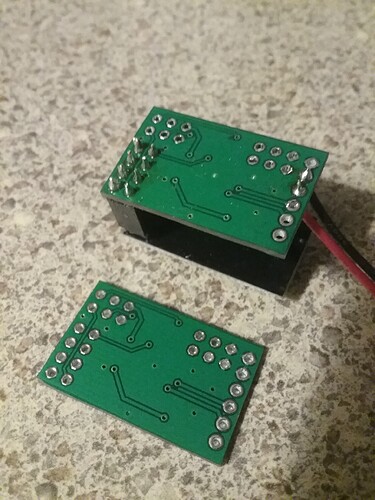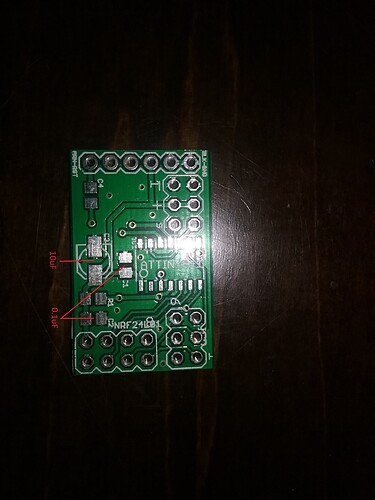Has anyone successfully used an nRF24L01+ 2.4ghz transiever with an Attiny841?
I am attempting to make a wireless node using those 2 main components on a board I made up. I cannot get them to work. I've made multiple boards and tried a few different RF24 transievers with no luck. My master board is not getting any reply.
I am using the SpenceKonde Attiny core - GitHub - SpenceKonde/ATTinyCore: Arduino core for ATtiny 1634, 828, x313, x4, x41, x5, x61, x7 and x8
And the tmrh20 NRF24 library - http://tmrh20.github.io/RF24/index.html
My Master Code
#include <SPI.h>
#include <nRF24L01.h>
#include <RF24.h>
#define CE_PIN 9
#define CSN_PIN 8
#define reedSwitchStatusBit (1 << 0)
#define batteryLowAlarmBit (1 << 1)
uint8_t masterAddress;
uint8_t nodeAddressIndex = 0;
const byte numberNodes = 2;
const byte nodeAddress[numberNodes][5] = {{'R','x','A','A','A'},
{'R','x','A','A','B'}};
RF24 radio(CE_PIN, CSN_PIN); // Create a Radio
bool newData = 0;
uint16_t nodeDataWord[20];
bool nodeCommStatus[20]; //0 = communication failure, 1 = ok
unsigned long currentMillis;
unsigned long prevMillis = 0;
unsigned long txIntervalMillis = 2000; // send once per second
void setup() {
Serial.begin(9600);
Serial.println("Home Security Wireless Master");
Serial.println("Version 1, 04AUG18");
radio.begin();
radio.setDataRate( RF24_250KBPS );
radio.enableAckPayload();
radio.setRetries(3,5); // delay, count
masterAddress = 255;
Serial.println("setup complete");
}
void loop() {
currentMillis = millis();
if ((currentMillis - prevMillis) >= txIntervalMillis)
requestNodeUpdate();
}
void requestNodeUpdate() {
Serial.print("Request for update from node ");
Serial.println(nodeAddressIndex + 1);
radio.openWritingPipe(nodeAddress[nodeAddressIndex]);
uint16_t radioWrite;
radioWrite = masterAddress;
radioWrite |= ((uint16_t(nodeAddressIndex) + 1) << 8);
nodeCommStatus[nodeAddressIndex] = radio.write(&radioWrite,sizeof(radioWrite));
if (nodeCommStatus[nodeAddressIndex]) {
if (radio.isAckPayloadAvailable()) {
radio.read(&nodeDataWord[nodeAddressIndex], sizeof(nodeDataWord[nodeAddressIndex]));
newData = 1;
}
else {
Serial.println("Reply From Node But No Data");
}
}
else {
Serial.println("No Reply From Node");
}
showData();
nodeAddressIndex += 1;
if ((nodeAddressIndex + 1) > numberNodes)
nodeAddressIndex = 0;
prevMillis = millis();
}
void showData() {
if (newData) {
Serial.print("Reply From Node ");
Serial.print((nodeAddressIndex + 1));
Serial.print(", ");
Serial.println(nodeDataWord[nodeAddressIndex]);
newData = 0;
}
}
My wireless node code
#include <SPI.h>
#include <nRF24L01.h>
#include <RF24.h>
#define CE_PIN 3 //attiny841 pin 6, PA7, digital pin 3
#define CSN_PIN 2 //attiny841 pin 5, PB2, digital pin 2
uint8_t reedSwitchInput = 7; //Reed Switch Input, attiny841 pin 10, PA3, digital pin 7
uint8_t heartbeatOutput = 10; //Heartbeat Output, attiny841 pin 13, PA0, digital pin 10
#define reedSwitchStatusBit (1 << 0)
const byte thisNodeAddress[5] = {'R','x','A','A','B'};
RF24 radio(CE_PIN, CSN_PIN); // Create a Radio
uint16_t nodeDataWord = 0;
uint32_t previousMillis = 0;
void setup() {
// Serial.begin(9600);
// Serial.println("Home Security Wireless Node");
// Serial.println("Attiny841, 8MHz, 3.3v");
// Serial.println("Version 1, 04AUG2018");
pinMode(reedSwitchInput, INPUT);
pinMode(heartbeatOutput, OUTPUT);
digitalWrite(heartbeatOutput, HIGH);
radio.begin();
radio.setDataRate( RF24_250KBPS );
radio.openReadingPipe(1, thisNodeAddress);
radio.enableAckPayload();
radio.writeAckPayload(1,&nodeDataWord,sizeof(nodeDataWord)); // pre-load data
radio.startListening();
// Serial.println("setup complete");
}
void reedswitch() {
bool reedSwitchState = digitalRead(reedSwitchInput);
if (reedSwitchState)
nodeDataWord |= reedSwitchStatusBit;
else
nodeDataWord &= ~reedSwitchStatusBit;
radio.writeAckPayload(1,&nodeDataWord,sizeof(nodeDataWord)); // pre-load data
}
void updatePayload() {
radio.writeAckPayload(1,&nodeDataWord,sizeof(nodeDataWord)); // pre-load data
}
void heartbeat() {
uint32_t currentMillis = millis();
if ((currentMillis - previousMillis) >= 2000) {
previousMillis = currentMillis;
bool currentState = digitalRead(heartbeatOutput);
if (currentState)
digitalWrite(heartbeatOutput, LOW);
else
digitalWrite(heartbeatOutput, HIGH);
}
}
void getData() {
if (radio.available()) {
uint16_t radioRead;
radio.read(&radioRead,sizeof(radioRead));
}
}
void loop() {
reedswitch();
heartbeat();
updatePayload();
getData();
}
Pins to pins are as follows
nRF24L01+ - Attiny841
1 (GND)
2 (3.3v)
3 (CE) - Pin 6, PA7, Digital Pin 3
4 (CSN) - Pin 5, PB2, Digital Pin 2
5 (SCK) - Pin 9, PA4, Digital Pin 6, SCK
6 (MOSI) - Pin 7, PA6, Digital Pin 4, MOSI
7 (MISO) - Pin 8, PA5, Digital Pin 5, MISO
8 (IRQ) - Pin 3, PB1, Digital Pin 1, INT0
I thought it would be because of digital pin 3 being the default SS for the SPI, and I am using digital pin 2. I used wire jumpers and swapped them around but still no luck. I also tried changing what pin was defined as SS in pins_arduino.h (under tinymodern folder in the hardware directory). Changed it from 3 to 2. Still no luck.
Pictures of my board are attached.
Any help would be appreciated.




